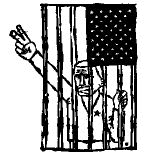“WE’RE OPERATING under the same rules as before,” says Charles Mandigo, the director of the FBI’s Seattle office. “I know there has been speculation. But our procedures are unchanged.”
Those were the special-agent-in-charge’s reassuring comments on terrorist-related investigations and arrests last week. Still, the pressure to overlook a civil liberty here or a covert detention there is growing as Mandigo’s field office plays an increasingly important role in the rush to contain terror and hunt down the fugitive Osama bin Laden.
“We’re getting quite a large number of calls from the public,” says Mandigo, a 25-year FBI vet. “From the calls and e-mails, we’ve generated over 800 leads here.”
Besides rounding up suspects in hate crimes and what at first was thought to be a U.S. chemical-attack plot by long-haul truckers, Seattle FBI agents also continue to grill confessed terrorist Ahmed Ressam, who has now given at least 15 lengthy interviews to the FBI at the SeaTac detention center.
Mandigo’s 130-some agents are also working to detect and head off any potential terror plots against local sites, from the Space Needle to Boeing plants.
It’s a serious threat, some say. Ex-Sen. Gary Hart, co-chair of the U.S. Commission on National Security, pegs Seattle as one likely site for “chemical, biological, or nuclear weapons” attacks by terrorists on midsized cities.
Another expert thinks of the Emerald City as a haven for terrorists. “Seattle, Los Angeles, New York, Atlanta, and Miami” may have terrorists cells, says U.S. security consultant Gary Stubblefield. “I know [of such cells] from all the open-source intelligence and from the trial of Ressam,” Stubblefield, an ex-Navy SEAL, told us last week. Ressam “has let loose lots of intel that is invaluable to better understand just how many terrorists we have let into our country—and who [is] poised to do more acts against us.”
At the least, the New York and Washington attacks should promote responsible vigilance and precautionary measures, experts say.
But, in anger and haste, don’t forget the little things like civil rights and due process. Patriotism and paranoia have a tendency to trample them.
“This willingness to surrender what we’re supposed to be fighting for,” says Nat Hentoff, The Village Voice columnist, “is a recurring part of our history.”
It isn’t only McCarthyism and the roundup of Japanese Americans during World War II or the passage of the Espionage Act during World War I—which sent more than a thousand to prison and led to mass deportations—that Hentoff refers to.
Hentoff notes that during the Civil War, President Lincoln imprisoned newspaper editors and other dissenters and suspended the right of habeas corpus. The great emancipator said the Constitution “is not a suicide pact,” that some basic freedoms can be fatal to national security. Says a worried Hentoff: “How many Americans, right now, would disagree with that conclusion?”
Attorney General John Ashcroft has already asked Congress to ease wiretap restrictions and arrest procedures, an issue Congress debates this week. The U.S. has detained more than 350 people since the Sept. 11 attacks, holding them on immigration violations, as material witnesses, or for suspected criminal activity. With war footing as justification, many are being held without probable cause.
Ashcroft’s proposed changes could further loosen restrictions. But he claims that won’t weaken civil rights protections. He just wants the law to catch up with technology, he says—allowing the government to use emerging capabilities to more easily eavesdrop.
Some, if not a lot, of that is already done in eastern Washington through a key National Security Agency high-tech listening post on the Yakima Firing Range and an NSA global-antenna farm in Brewster, Okanogan County, which can overhear local phone calls and read e-mail.
There’s a technological notion similar to Ashcroft’s behind the proposal of Sen. Maria Cantwell, D-Wash., the onetime RealNetworks vice president, who is pushing for expanded use of computerized identification systems to catch terrorists. Oracle CEO Larry Ellison also proposes creation of a mandatory national ID card, for which he’d supply the software.
Cantwell says we can trust her and other lawmakers to do the right thing. “It’s less about stomping on our civil liberties and more about building an information system,” she says with Orwellian promise.
It has to make you wonder, in the midst of this search for enemies, how much we need to worry about our friends.
We asked the FBIs Mandigo for more reassurance.
In connection with the terror hunt, has anyone been arrested here other than those we know about?
“No.”
Is anyone being secretly held for questioning or as a material witness?
“No.”
Will you inform the public about any future arrests or detentions?
“Yes.”
So it’s business as usual?
Yes, he said. “For now.”
Emphasis mine.








